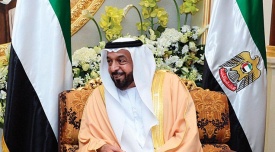06.12.2014

In the past six months, it has flexed its military muscles for the first time, carrying out airstrikes in Libya and supported the US-led effort against the Islamic State in Iraq and Syria (Isis). The legacy of the UAE’s founder and first president Sheikh Zayed bin Sultan al-Nahyan is visible throughout the country. In 2014, the UAE is more comfortable than ever in its role as a leading power in the Middle East, a report in MEED read.
In the past six months, it has flexed its military muscles for the first time, carrying out airstrikes in Libya and supported the US-led effort against the Islamic State in Iraq and Syria (Isis).
While Sheikh Khalifa has presided over an almost seamless transition from his predecessor, the last decade has not been without its challenges.
As ruler of Abu Dhabi, Sheikh Khalifa was forced to bail-out Dubai to the tune of $20bn when the emirate’s property bubble burst amid an overwhelming debt crisis. He has also had to look at ways to distribute services to the poorer northern emirates.
The leader’s efforts to expand political participation have seen mixed results. Sheikh Khalifa introduced indirect elections to the Federal National Council and then expanded the number of citizens allowed to vote to more than 129,000. But turnout for the 2011 election was disappointing, and it is unclear how to promote political engagement among Emirati nationals.
With the current falling oil prices creating economic uncertainty, the president faces a new challenge to continue upwards momentum in the face of lower government revenues.
In the past six months, it has flexed its military muscles for the first time, carrying out airstrikes in Libya and supported the US-led effort against the Islamic State in Iraq and Syria (Isis).
While Sheikh Khalifa has presided over an almost seamless transition from his predecessor, the last decade has not been without its challenges.
As ruler of Abu Dhabi, Sheikh Khalifa was forced to bail-out Dubai to the tune of $20bn when the emirate’s property bubble burst amid an overwhelming debt crisis. He has also had to look at ways to distribute services to the poorer northern emirates.
The leader’s efforts to expand political participation have seen mixed results. Sheikh Khalifa introduced indirect elections to the Federal National Council and then expanded the number of citizens allowed to vote to more than 129,000. But turnout for the 2011 election was disappointing, and it is unclear how to promote political engagement among Emirati nationals.
With the current falling oil prices creating economic uncertainty, the president faces a new challenge to continue upwards momentum in the face of lower government revenues.






